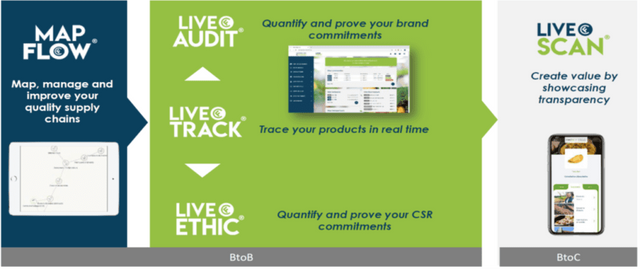Connecting Food, IBM, and Columbia University: disrupting world’s oldest industry

When we first reported about the cooperation between Columbia University and IBM in the blockchain space, we promised to keep our readers informed on the latest developments. In particular, we're going to focus on the companies being accelerated by The Columbia-IBM Blockchain Accelerator’s two programs.
Today Connecting Food is in the spotlight - a company which was selected amongst the ten similar organizations from around the world for the Network program of the accelerator. This French startup is applying blockchain technology to make supply chain in the food industry more efficient, as well as to enhance consumer experience and protect brand reputation. To learn more about this project, we sat down with Maxine Roper, a co-founder of Connecting Food.

Maxine RoperBoth of the project's co-founders (Ms. Roper and Mr. Volpi), having worked for Nestle, Danone, Mars, and Sara Lee in various capacities, have had decades of experience in the food industry prior to starting their new venture in 2016. Thus, the company wasn’t founded based on intuition or a dream, but on the basis of empirical immersion in the problems faced by the industry.
The first year of operations had been funded by the €200,000 furnished by the founders, and most of it was spent on the R&D. To date, €2,000,000 has been invested in the company including the founders’ capital, government subsidies, and equity investment from the nine business angels. However, Ms. Roper and Mr. Volpi still own 84 percent of the company.

"Food is the oldest market, but it is the last one to be disrupted," Roper points out. Currently, the company is offering a suite of B2B products: LiveTrack allows producers to track food in real time in its supply chain. For example, in the case of yogurt, the producer would be able to see where the milk and the fruits are coming from, how they are moving along its supply chain, and how long the process takes. This model enables them to get a single view of the entire process.
Just because something is on the blockchain, doesn’t make it true. You have to make sure that the information that is being entered is factually true in the first place. That is what LiveAudit is doing. It’s truly revolutionary. Up until now, the audit has been done manually by human beings. Usually, a couple of times a year, an auditor would go to a farm and check for example, whether the eggs that are marked as organic are produced consistently with the label. Now, everything is being reported live (live in the food industry means within a few hours).The data is being reported by various sensors that are already prevalent in the industry, which can report such data as geolocation, temperature etc.
For certain products, it is very important to know that they come from a particular region; for example, cheese or wine.And these data are being audited live. This can produce major savings for the companies. For example, if it is detected that those eggs are truly organic then “they can be rerouted” – instead of being recalled, they can still be sold but as “regular”, not organic. In addition, the farmers (food producers in general) get rewarded for sharing their “upstream” data with Connecting Food. They are implementing smart contracts to automate this task, so as soon as the company receives the data from a farmer, reward tokens get sent back to the farmer. “This upstream data is the most valuable data,” notices Ms. Roper.
Unlike the aforementioned products, LiveScan is B2C. The producers who choose to implement may add a barcode to the package, which can be scanned by the consumer to receive all the available information about the product.
We had to ask Ms. Roper: “Why do you need blockchain”? –
To make sure that information is tamper-proof and to make audits efficient. But you don’t have to put everything on the blockchain.When it comes to the blockchain, the company started off building on top of Ethereum. “We are moving to Hyperledger for the upstream part because that is what the clients prefer, and we need a scalable solution”. This issue comes up time after time, when one speaks with business people who are implementing blockchain solutions in the corporate settings – general mistrust of public blockchains. “But we believe in using several blockchain platforms, so interoperability is important”.
In 2018, Connecting Food earned €180,000. But in 2019, they expect revenue of around €2.5-3 million. They also expect to raise another round by the end of 2019, which will allow the company to scale globally. They are still considering fundraising through ICO where they would issue a token backed by the upstream data they receive from the farmers, but the timing may not be right.
“What are your expectations from the accelerator program”? –
It gives access to great resources, both from Columbia University and IBM. Also, we like IBM’s idea about building business networks, we hope to find good partners through this program.
Originally posted on Crypto Insider : https://cryptoinsider.com/connecting-food-ibm-and-columbia-university-disrupting-worlds-oldest-industry/